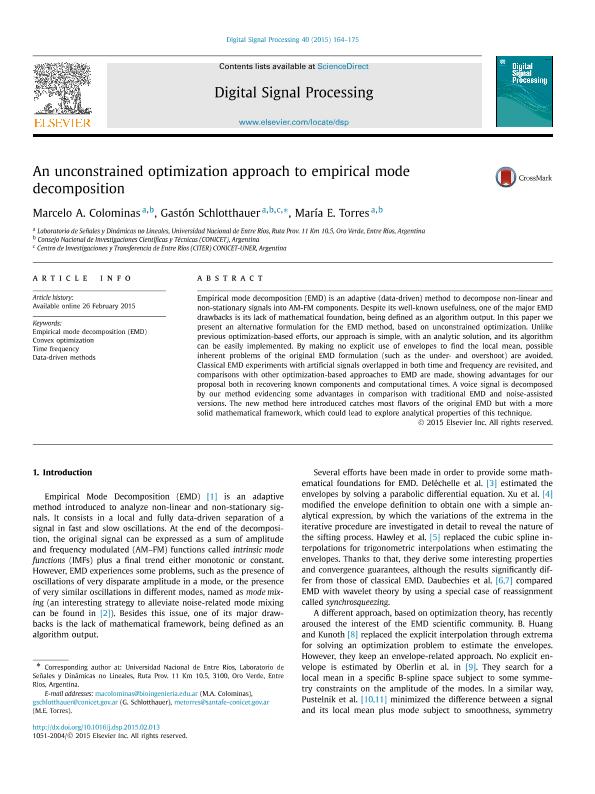Mostrar el registro sencillo del ítem
dc.contributor.author
Colominas, Marcelo Alejandro

dc.contributor.author
Schlotthauer, Gaston

dc.contributor.author
Torres, Maria Eugenia

dc.date.available
2018-04-10T20:02:54Z
dc.date.issued
2015-05
dc.identifier.citation
Colominas, Marcelo Alejandro; Schlotthauer, Gaston; Torres, Maria Eugenia; An unconstrained optimization approach to empirical mode decomposition; Academic Press Inc Elsevier Science; Digital Signal Processing; 40; 5-2015; 164-175
dc.identifier.issn
1051-2004
dc.identifier.uri
http://hdl.handle.net/11336/41591
dc.description.abstract
Empirical mode decomposition (EMD) is an adaptive (data-driven) method to decompose non-linear and non-stationary signals into AM-FM components. Despite its well-known usefulness, one of the major EMD drawbacks is its lack of mathematical foundation, being defined as an algorithm output. In this paper we present an alternative formulation for the EMD method, based on unconstrained optimization. Unlike previous optimization-based efforts, our approach is simple, with an analytic solution, and its algorithm can be easily implemented. By making no explicit use of envelopes to find the local mean, possible inherent problems of the original EMD formulation (such as the under- and overshoot) are avoided. Classical EMD experiments with artificial signals overlapped in both time and frequency are revisited, and comparisons with other optimization-based approaches to EMD are made, showing advantages for our proposal both in recovering known components and computational times. A voice signal is decomposed by our method evidencing some advantages in comparison with traditional EMD and noise-assisted versions. The new method here introduced catches most flavors of the original EMD but with a more solid mathematical framework, which could lead to explore analytical properties of this technique.
dc.format
application/pdf
dc.language.iso
eng
dc.publisher
Academic Press Inc Elsevier Science

dc.rights
info:eu-repo/semantics/openAccess
dc.rights.uri
https://creativecommons.org/licenses/by-nc-sa/2.5/ar/
dc.subject
Empirical Mode Decomposition (Emd)
dc.subject
Convex Optimization
dc.subject
Time Frequency
dc.subject
Data-Driven Methods
dc.subject.classification
Ingeniería de Sistemas y Comunicaciones

dc.subject.classification
Ingeniería Eléctrica, Ingeniería Electrónica e Ingeniería de la Información

dc.subject.classification
INGENIERÍAS Y TECNOLOGÍAS

dc.title
An unconstrained optimization approach to empirical mode decomposition
dc.type
info:eu-repo/semantics/article
dc.type
info:ar-repo/semantics/artículo
dc.type
info:eu-repo/semantics/publishedVersion
dc.date.updated
2018-04-10T17:50:57Z
dc.journal.volume
40
dc.journal.pagination
164-175
dc.journal.pais
Estados Unidos

dc.description.fil
Fil: Colominas, Marcelo Alejandro. Consejo Nacional de Investigaciones Científicas y Técnicas; Argentina. Universidad Nacional de Entre Ríos. Facultad de Ingeniería; Argentina
dc.description.fil
Fil: Schlotthauer, Gaston. Universidad Nacional de Entre Ríos. Facultad de Ingeniería; Argentina. Consejo Nacional de Investigaciones Científicas y Técnicas. Centro de Investigaciones y Transferencia de Entre Ríos. Universidad Nacional de Entre Ríos. Centro de Investigaciones y Transferencia de Entre Ríos; Argentina
dc.description.fil
Fil: Torres, Maria Eugenia. Universidad Nacional de Entre Ríos. Facultad de Ingeniería; Argentina. Consejo Nacional de Investigaciones Científicas y Técnicas; Argentina
dc.journal.title
Digital Signal Processing

dc.relation.alternativeid
info:eu-repo/semantics/altIdentifier/doi/http://doi.org/10.1016/j.dsp.2015.02.013
dc.relation.alternativeid
info:eu-repo/semantics/altIdentifier/url/https://www.sciencedirect.com/science/article/pii/S1051200415000706
Archivos asociados
